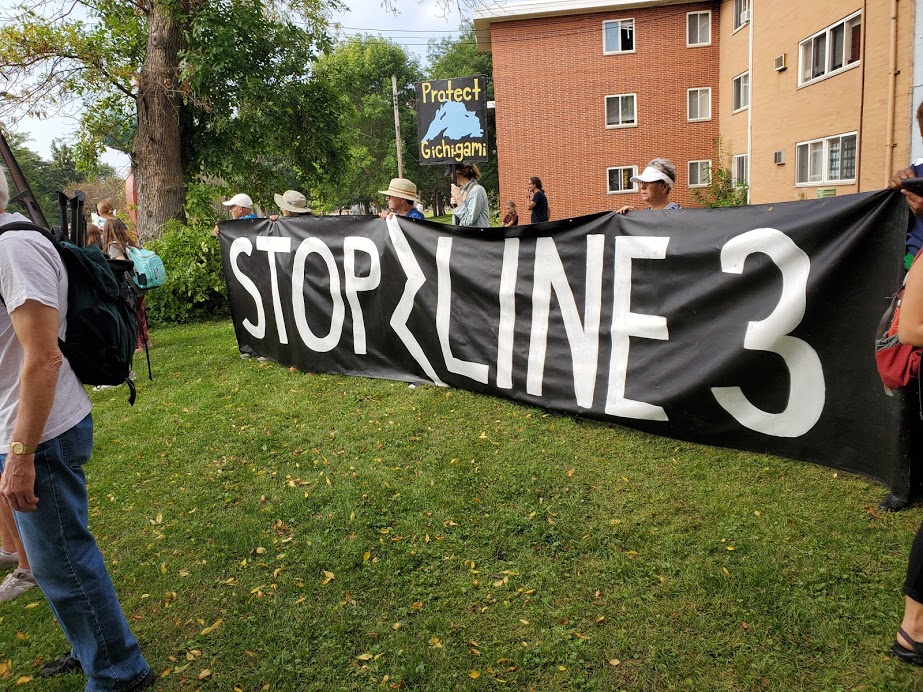
Matt Doll, Minnesota Environmental Partnership
This Wednesday marks the deadline for the Minnesota Commerce Department to choose whether to renew a critical challenge to the Enbridge Line 3 pipeline expansion project. Two years ago, it filed an appeal against the Public Utilities Commission (PUC) decision to approve the pipeline, on the grounds that Enbridge had not proven that demand merited its planned doubling of the current Line 3’s capacity on this new route. The Commerce Department previously argued that the new pipeline was not needed by Minnesota at all, and that Minnesotans would be better off if Enbridge shut down the old Line 3 rather than replacing it.
Because of legal requirements, the Commerce Department has to affirmatively refile its appeal, and the ball is in Governor Walz’s court. If he directs Commerce Commissioner Steve Kelley to continue the challenge, it will continue being a useful tool in the fight against Line 3.
There is no scientific or economic reason that continuing the appeal this year would be any less correct than it was last year. Enbridge still has not given proof that its pipeline is needed to meet oil demand, which has been dropping in Minnesota for years and is not expected to bounce back. The Canadian tar sands oil industry, which would provide the dirty oil that would flow through Line 3, is in a massive economic downturn. And any oil that did flow would mostly head for foreign markets, though Minnesotans would end up subsidizing Enbridge for the privilege of carrying the unnecessary oil.
Beyond the legal specifics of this appeal case, we know, as we have for years, that Line 3 is a catastrophic threat to climate, water, and Minnesota communities.
Science has unambiguously told us that the world needs to cut emissions and fossil fuel infrastructure now, not add to them. The consumption of this oil and the operation of the pipeline over the course of its life would emit the equivalent greenhouse gases of 50 new coal plants, with a social cost estimated at nearly $300 billion. Enbridge won’t be paying that money, of course – the company’s total net worth is less than $70 billion. It will socialize those costs by making the climate crisis worse, while retaining private profits for itself.
Right now, the Minnesota Pollution Control Agency is considering whether to grant Enbridge a water quality permit, and MEP and our partners – as well as 34 Minnesota legislators – have asked it to deny the permit. Aside from the climate damage to our water resources, the hundreds of waters this new pipeline would cross would be under the ever-present spill risk. Based on Enbridge’s track record, and the increasing likelihood of severe weather events, such a spill is less a question of “if” than of “when.” While it’s true that the existing Line 3 is aging and is itself a spill risk, the responsible solution is not to invest in more obsolete infrastructure, but to shut the old line down, given that its capacity is no longer needed.
From the beginning, Enbridge’s pipelines have trampled the rights of Ojibwe communities, as its pipelines cross through treaty lands where the Ojibwe have the legal right to hunt and harvest natural resources, including wild rice. While the new Line 3 route was created in part to avoid reservation land, it still threatens Ojibwe communities’ safety, treaty resources, sacred lands, and water supplies. As we’ve seen with other oil pipeline companies, Enbridge has treated indigenous opposition to Line 3 as an obstacle to be managed through capture of the regulatory system, not by respect for environmental justice.
All of these issues are moral reason enough to stop Line 3 from ever snaking its way through Minnesota. Unfortunately, members of legal bodies like the PUC have not seen it that way, and frequently abdicated their responsibility to protect Minnesotans’ interests. But Enbridge has willfully violated the law by failing to prove that its pipeline is needed to meet demand (because it isn’t) rather than the economic interests of oil companies. That’s an opening to put a halt to this industry-dominated process.
What you can do:
Call Governor Walz at 651-201-3400 and ask him to continue the Line 3 appeal. This is an opportunity for the Governor to show climate and environmental leadership at a time when it is more important than ever to act boldly and decisively for our people and planet.